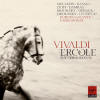Texte paru dans: / Appeared in:
*

GRAMOPHONE (03/2011)
Pour s'abonner /
Subscription information

Virgin Classics
VIR6945450
Reviewer: David Vickers
In 1722 Vivaldi’s career hit a few snags in his native Venice, but very little of his music had yet been performed in Rome, so he regarded this as an opportunity to cultivate new business opportunities in the eternal city, where his new opera Ercole s’ul Termodonte was first performed at the Teatro Capranica on January 23, 1723. The libretto was adapted from an old text by Antonio Salvi about the ninth labour of Hercules, commanded by Eurystheus to obtain the sword and girdle of the fierce Amazonian queen Antiope; naturally, the plot is embellished by the misunderstandings and intrigues between several sets of lovers. The infectiously enthusiastic scholar Frédéric Delaméa contributes a customarily superb booklet-note but he has also had a benign influence upon Fabio Biondi’s attempt to reconstruct the music, for which no single complete source survives. Biondi’s claim that Ercole is now “restored to its original form” is an over-excited exaggeration: the only full text of Ercole is its printed libretto, although most of the arias survive in miscellaneous secondary sources scattered throughout libraries in Turin, Paris and Munster, and Vivaldi parodied quite a few numbers from eight different previous operas written for Venice, Mantua and Vicenza. Biondi provides an admirably clear list of his sources and methods, and has composed new recitatives throughout, hoping that this “will not be seen as presumptuous”.
Virgin’s contrived all-star cast has even the smallest roles performed by A-list singers with high reputations. Maybe the gathering together of such a “dream team” derives from greater concern for superstar selling-power than artistic integrity about characterisation, musical aptitude, etc. The inclusion of Joyce DiDonato, Philippe Jaroussky and Diana Damrau is an obvious instance of Vivaldi being used to serve Virgin’s roster of star singers — not that the composer would have objected, nor found such an attitude strange in Italian Baroque opera houses. Indeed, it is exciting to hear a Baroque opera sung by an almost entirely high-class cast (only thee threadbare Patrizia Ciofi is below par), although it seems odd that such lavish values have been accorded to an editorial reconstruction of an undeniably obscure and average work by a composer inconsistent in the genre.
Rolando Villazón is suitably larger than life as Hercules; he gets around tricky coloratura passages and embellishes with unbridled bravado but there are some hints of strain and his phrasing is sometimes clumsy. In contrast, Topi Lehtipuu enhances the Vivaldian credentials established recently by his outstanding recital disc (Naïve, 2/11). Romina Basso is in captivating voice as Teseo (the lyrical “Ti sento, sì ti sento”, borrowed from Teuzzone), and there is also impressive singing by Damrau (marvellous high passages in “Ei nel volto ha un non so che”) and Vivica Genaux (chilling venom in the suicidal rage aria “Scenderò, volerò, griderò”). However, Vivaldi’s dramatic situations, such as they are, don’t arouse much vivid interaction between most of the cast. For instance, DiDonato’s voice is ravishing in Ippolita’s “Onde chiare che susurrate” (the pastoral-tinged opener of Act 2, and one of the handful of numbers preserved intact without requiring Biondi’s editorial creativity), but her words are under characterised. Likewise, Antiope’s response, “Bel piacer ch’è la vendetta”, is supposed to be an ecstatic expression of unquenchable revenge but Genaux’s pretty performance lacks all trace of the gloating nastiness intended by the words. The underwhelming atmosphere is perhaps inevitable because the recording sessions at Florence’s Teatro alla Pergola took place in three batches far apart across a two-year period; one wonders if all of these famous singers were ever under one roof at the same time. However, spirited gusto is certainly the order of the day from Europa Galante: the opening Sinfonia typifies the crisp declamatory style of the strings, and a thrilling Sinfonia at the end of Act 1 depicts a battle between the Greek heroes and the Arnazonians with splendid horns and thumping timpani; Alceste’s lovely slow aria “Quelia beltà sol degna è d’amor” features Biondi’s beguiling viola d’amore obbligato (and is sung beautifully by Jaroussky), and aria accompaniments are always as lively or delicate as possible.
*
Consultez les autres critiques en rapport
avec cet enregistrement -
Read all the other reviews pertaining to this CD -
Cliquez l'un ou l'autre
bouton pour découvrir bien d'autres critiques de CD
Click either button for many other reviews


